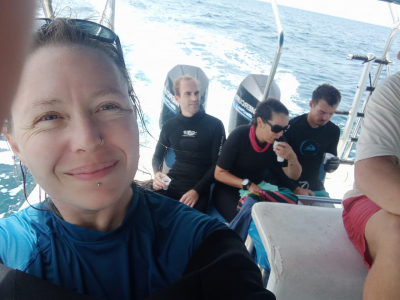META-REEF
People involved
Coral-Reef meta-ecosystem : energy and nutrient fluxes across components
Coral reefs develop naturally in oligotrophic zones, i.e. very low in nutrients, yet manage to maintain a very high level of richness and biomass, thanks not only to extensive and efficient internal recycling, but also to their ability to interact with energy sources and nutrients from other systems. From a theoretical point of view, a meta-ecosystemic approach - an extension of the concept of metapopulation and meta-community - is essential to better understand how reefs function. The aim of the META-REEF project is to study the functioning of coral reefs by quantifying energy and nutrient flows between reefs and associated systems: seagrass beds, pelagic systems, lagoons, bird islets and shallow reefs, combining community ecology and landscape ecology approaches.
The project is taking place at three sites: Grand cul-de-sac marin in Guadeloupe, New Caledonia and Palau in Indonesia. At each site, samples of flora and fauna, as well as sediment, water and fluorometric measurements, are being taken along a gradient from the reef to the associated systems. An isotopic approach (bulk and specific compounds) is planned to trace and measure nutrient flows within the meta-ecosystem.
Funding: LabEx CORAIL
Project coordinators :
- Valeriano Parravicini (EPHE)
- Eric Vidal (IRD)
BOREA Project Contact: Charlotte Dromard (charlotte.dromard@univ-antilles.fr)
- Mayalen Zubia (Univ de Polynésie française, UMR EIO)
- Mohsen Kayal (IRD, UMR ENTROPIE)
- Fanny Houlbreque (IRD, UMR ENTROPIE)
- Anne Lorrain (IRD, UMR LEMAR)
- Yves Letourneur (Univ de la Réunion, UMR ENTROPIE)meta reef_
- Laurent Vigliola (IRD, UMR ENTROPIE)
- Matthieu Le Corre (Univ de la Réunion, UMR ENTROPIE)
- Cyril Marchand (Univ de Nouvelle Calédonie, ISEA)
- Camille Clerissi (EPHE)


